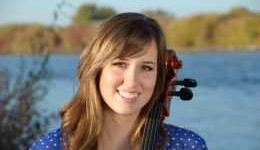Tessa S



Instruments: Cello
Styles: Classical, Jazz, Pop, Rock, Blues, Folk, Country, Gospel, Funk, Electronic, Flamenco, Showtunes, Spirituals


Tessa S


Instruments: Cello
Styles:
Classical, Jazz, Pop, Rock, Blues, Folk, Country, Gospel, Funk, Electronic, Flamenco, Showtunes, Spirituals
Where I Teach:
My Studio
Online
Ages Taught: 7-80
ABOUT
Degrees / Training / Special Info:
BM, Brigham Young University, Cello Performance
Suzuki Certified
CPR Certified
AED Certified
14 years of expierence
Awards:
20110-2014 Cello Section Leader of Idaho Falls Youth Symphony 2014- Idaho State Solo competition winner 2016- Texas Christian University Cellofest participant 2014-2018 BYU Philharmonic Orchestra
Overview:
Tessa grew up in Idaho Falls and is proud to call South East Idaho her home. She started cello at age 7 and studied with Dr. Rebecca Lyman in High School. Tessa received her Bachelors in Cello Performance from Brigham Young University, under the direction of Dr. Michelle Kesler, in 2019.
Tessa’s passion is teaching cello! She has taught for over 14 years, and enjoys working with all levels and ages. She loves all styles of music including classical, folk, rock and pop. Tessa’s teaching style is adaptable to fit the unique needs of each individual student, but most importantly, to help her students find joy in the process of learning music.
Tessa has been involved in many symphonies, including the BYU Philharmonic, the Utah Symphony, and currently plays in the Idaho Falls Symphony.
EXPERIENCE
Tessa grew up in Idaho Falls and is proud to call South East Idaho her home. She started cello at age 7 and studied with Dr. Rebecca Lyman in High School. Tessa received her Bachelors in Cello Performance from Brigham Young University, under the direction of Dr. Michelle Kesler, in 2019.
Tessa’s passion is teaching cello! She has taught for over 14 years, and enjoys working with all levels and ages. She loves all styles of music including classical, folk, rock and pop. Tessa’s teaching style is adaptable to fit the unique needs of each individual student, but most importantly, to help her students find joy in the process of learning music.
Tessa has been involved in many symphonies, including the BYU Philharmonic, the Utah Symphony, and currently plays in the Idaho Falls Symphony.
METHODS USED
I teach using the Suzuki method with an added emphasis on note reading and theory. The Suzuki method is a lot more than just using the Suzuki Repertoire. (In fact, I supplement the Suzuki method with pieces my students use a lot such as Happy Birthday, Jingle Bells, some pieces from Solos for Young Cellists, etc.) So what is the Suzuki method? Suzuki revolutionized the way of learning an instrument. He came up with the mother tongue method of taking aspects of how we learn a language and applying them to learning an instrument.
LESSON STYLE
The main aspects of the Suzuki method are the following: * Listening --We must listen (lots) in order to progress. Most people can speak fluently in their native language from years of being immersed in the language. * Positive Environment—Let’s create a positive experience learning cello * Repetition and Accumulation -- We continue to review the pieces helping the student focus on more advanced aspects. I also encourage each student to do a solo recital where students perform the entire Suzuki book from memory when completed. * Learning to Read --I am a strong advocate of note reading, and make it a high priority. * One of my favorite parts of the Suzuki philosophy is that hard work is more valuable then talent. It does not matter if it takes 500 times or 5,000 times. Talent can be developed, and our abilities increased through our efforts! Expectations at the Lesson: Students should be respectful and attentive. If the student is under 12 years old, the ideal setting is to have a parent attending all lessons. Parents should take notes and listen attentively. If the student is older, parents are still welcome, but it is not as crucial. Some adult students have preferred to bring a spouse, and that is fine too. Siblings may come if they are quiet and respectful of the learning environment. Expectations at Home: Practicing: The ideal is to practice 6 days a week. I have found the number of days practiced correlates directly with progress and attitude towards the instrument. 0-1 days -- frustrating, going backwards 2-3 days -- dissatisfied, may be able to maintain 4 days -- maintaining and perhaps slow progress 5 days -- satisfied, progress 6 days -- enjoyment, fast progress Practicing needs to be a daily routine. Practice, and be positive! If done correctly, this can be a very enjoyable time. Listening is essential, and it's not just a little bit of listening. When we learn to speak, we hear words around us almost 24/7. We must create a learning environment. I don't think I can emphasize listening enough. I encourage the following as a minimum: - Listen to your current piece at least 2 times a day. This may only be 5-10 minutes at first but will increase as pieces become longer. - Listen to as much good classical music as possible and introduce you and your family to some of the greatest classical literature!
PHOTOS & VIDEOS
Leave a Review
Leave a Review
RATING & REVIEW

